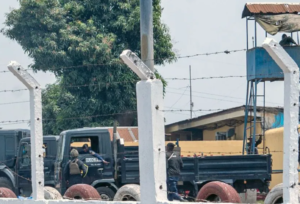The notoriously bad conditions and extreme congestion at Makala Prison in Kinshasa, the capital of the Democratic Republic of the Congo (DRC), have brought the prison to international notoriety. Makala presently houses approximately ten times the amount of inmates that were originally intended to fit—roughly 1,500. Some have said the facility is a living nightmare due to the overpopulation, lack of basic services, and incompetent management.
Poor Living Conditions and Overcrowding
Inmates at Makala Prison range from those convicted of minor offenses and political prisoners to those who have committed violent crimes. Inmates sleep in cramped quarters, sometimes on the floor, because the prison’s infrastructure is woefully unprepared to deal with such a large influx of people. A journalist and ex-inmate named Stanis Bujakera recorded footage of guys sleeping on the narrow walls that separate shower stalls, as well as other inhumane living conditions.
Things are becoming worse since basic services aren’t available. Inmates often go long periods without light or air conditioning since power is unstable and clean water supplies are inconsistent. The lack of proper medical treatment has worsened a host of health problems brought on by these circumstances, including the spread of infectious infections. Tragically, inmates are often left to their own devices, leading to countless cases of starvation, sickness, and other avoidable causes of death.
A Failed Attempt at Evasion: The Human Cost
After 129 convicts perished in a botched escape attempt, the harsh circumstances at Makala Prison were brought to light. Most of the victims died of suffocation, as detainees were crushed in their haste to flee, said Interior Minister Jacquemain Shabani. Security personnel opened fire on others who tried to escape during the breakout.
An Unequal and Self-Governing System
In addition to institutional injustices, physical neglect is a major problem at Makala Prison. In the prison, there is a special VIP section that offers more space and nicer circumstances, including beds, but these privileges are not cheap. According to Bujakera, a spot in this section was originally going for $3,000, but he was able to negotiate a reduction to $450. convicts’ economic status establishes a social hierarchy, with the lowest-class convicts subjected to the harshest living conditions.

Also, the jail has developed its own peculiar and disturbing style of self-governance due to the absence of adequate supervision. Inmates are allowed to handle their own affairs because to the lack of wards, which leads to unhealthy power dynamics and regular fights. While incarcerated in Makala from 2015 to 2016, human rights campaigner Fred Bauma likened this system to stepping into a foreign nation with its own regulations. Every day is a fight for survival in this violent and unpredictable climate caused by the lack of an organized authority.
Systemic Problems and Persistent Lack of Funding
There are deeper, systemic issues with the criminal system in the DRC, of which the terrible condition of Makala Prison is only one manifestation. The World Prison Brief reports that the DRC’s prisons are among the world’s most overcrowded, with institutions regularly running at capacity or above. The inefficiency of the justice system, which results in the prolonged detention of many prisoners without trial, contributes to this chronic overpopulation. The fact that suspects are frequently held in prison even in the absence of formal charges is something that Deputy Justice Minister Samuel Mbemba has pointed out.
Demands Immediate Change
Prisons in the DRC, including Makala, are in a terrible state, and there have been demands for immediate reform in response. Human rights groups have long called for more prisons and better administration of current ones, as well as more money and compliance with international norms for the treatment of detainees. Such adjustments, according to Rostin Manketa, executive director of the human rights organization La Voix des Sans Voix in the Congo, are necessary to forestall similar catastrophes in the future.
In summary
The larger problems with the justice system in the Democratic Republic of the Congo are symbolized by Makala Prison. Conditions have become harsh and fatal due to overcrowding, insufficient facilities, and systemic neglect. There is an immediate need for change, as these flaws have recently come to light due to the unsuccessful escape attempt that claimed the lives of 129 people. Stakeholders on a global and national scale must work together to ensure that all inmates have their fundamental human rights protected if we are to overcome these obstacles. The only way to give hope to individuals who have been abandoned in one of the world’s most infamous jails is through extensive reform, which will end the cycle of neglect and pain.













